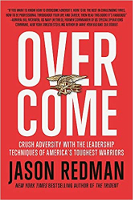
Image by Engin Akyurt
Narrated by Marie T. Russell
The only thing that makes life unfair
is the delusion that it should be fair.
-- Steve Maraboli
Guess what? Life is unfair, and combat is unequivocally unfair.
Crazy things happen in combat that you don’t expect and can’t plan for. A bomb could blow up, killing everyone around you, while you escape without a scratch. The best soldier in a platoon could be wounded in action, while the worst goes unscathed. There’s no rhyme or reason.
SEAL instructors want to prepare you for that from day one, and in training, they’re looking for individuals who can deal with heavy doses of bone-crushing, unfair punishment and still drive forward to get things done. Even something as simple as a room inspection is an opportunity to learn “fairness,” or the lack thereof.
Before room inspection, the instructors will tell you exactly how your room needs to be cleaned. It’s not rocket science. You clean your room perfectly. When the room inspection begins, you stand at attention listening to the chaos move through the building. As the instructors approach your room, you hear curses and shouting as each room fails.
Not me, you think. My room is perfect.
When they finally step into your room, you begin to sweat as you watch students run by your room dripping in sand and salt water after they failed and got their punishment on the beach.
On one room inspection, my squadmates and I knew we had achieved perfection. When the instructors entered our room, they walked around and talked about how perfect the room was.
“THIS is the cleanest room I have ever seen,” one instructor said.
Another nodded. “We should have the rest of the class come in here and see how it is done. This is the level everyone should be working to achieve.”
“It’s a triumph,” the first instructor said, checking the final corner.
At nineteen years old, I actually believed them.
The instructor in the corner stepped to the middle of the room, frowning. “You know what’s wrong with this room?” He pointed to a spot on the floor. We looked to where he pointed like a bunch of dummies, staring at a gleaming, shining floor that Mr. Clean himself would have been proud of. Suddenly, the senior chief instructor pulled a handful of sand out of his pocket and dropped it on the floor.
“There’s sand on the floor,” he said. “Fail!”
We ran to the beach with the rest of the unit.
This is bullshit, I thought. They cheated!
I didn’t get the lesson they were teaching until years later. No matter how perfect your preparation, you can still be wrong and fail in an absolutely catastrophic and unexpected way.
The key isn't to avoid failure. That's impossible. The key lies in how you get past that failure and how quickly you motivate and inspire the people around you to drive forward.
In an unfair world, you have to adapt. You have to OVERCOME.
VISUALIZE ALL OUTCOMES
One key component of adaptation is thinking through what might happen. If you can visualize possible outcomes, you can plan to mitigate the effects of those worst-case scenarios.
In the SEAL teams, every team member brainstorms the scenarios, plans contingencies, and talks about the absolute worst-case scenarios. Then we train to deal with as many as possible. We might not see any of the scenarios we create, but the exercise teaches us to adapt to changing conditions. The practice runs show us a variety of ways to meet those challenges, and if we do encounter something similar on the battlefield, we are not trying to come up with solutions in a crisis situation when time is of the essence.
The same principle applies in life. To adapt and overcome, you have to think ahead, pay attention to signs, and plan for the worst.
When the doctor tells you, “Man, if you don’t make a change to your diet and exercise, you are putting yourself at risk," you owe it to yourself, at least for a few minutes, to ask, "If I continue to avoid dealing with this problem, what's the worst-case scenario?" You could have a heart attack or a stroke. Ask your doctor for the worst-case scenario if you can't identify it for yourself. It's better to have straight answers than to rely on guesswork.
Once you know the worst-case scenario, be proactive to prevent that ambush from happening. I meet so many people who step into a life ambush and say, "Oh my God, that was so unexpected!" but when they dig into what happened to them, it turns out they had been given multiple signs beforehand but failed or procrastinated to take action. They let the ambush happen from laziness and ignorance.
NO MATTER WHAT, NO MATTER HOW
I remember going through close quarters combat training years ago. Close quarters combat is a fancy name for clearing a building or house with guns and explosives. There are multiple tactics and strategies to do this safely, efficiently, and as quickly as possible. In this scenario we were using live role players and paint-filled bullets in our guns called Simunition. On this iteration, they had told us a specific door was off-limits, meaning to ignore it. No one was supposed to come through that door. They had put a big X with caution tape on the door to signify it was “out of play.”
After a half day of doing iterations through the house, the instructors quietly removed the X from the door. As we made our next run through the house, we had been conditioned to ignore that door, but this time it was in play, and as the instructors expected, we did not cover that door. We blew right by it. As soon as we called that room secure and were moving our people past it, someone opened the door and started shooting our guys in the back.
A bad leader would say, “You told us that nobody would come in from this door over there, that it was off-limits, so we didn’t check it!”
But it was our fault for not being aware that something had changed. The unexpected had happened, as it always will. SEALs do that on purpose, always training for the unexpected, because we want our people to constantly recognize that the unexpected can happen.
We have a saying: “Despite your best plan, the enemy always has a vote.” This applies in business too. Despite your best plans, the market and your competition always have a vote. Are you ready to adapt to their unexpected actions?
In the real world, thankfully, failing to adapt doesn’t usually result in immediate death. But a lack of reaction time can still ruin a great business deal, meeting opportunity, or significant event. Resolve to act and drive forward, no matter what, no matter how.
LOOKING THE OBSTACLE IN THE FACE
Life isn’t fair. If you think it will go easy on you, think again. Just because you’ve found some success at some point in your life, it doesn’t mean you can coast on your achievements.
The good news is that you are tough enough to deal with it. You can overcome. You can look the obstacle in the face and say, “I don’t know how, but I am going to accomplish my mission. It means too much to me to give up now.”
That doesn’t mean you can do it alone. You won’t be able to accomplish your mission without the help and support of the people around you.
But no one can support you unless you give them something to support. It begins with you. When life treats you unfairly, are you going to give in and let the world have its way? Or are you going to adapt? Are you going to shift tactics, try something new, get some help, and then launch afresh?
Are you going to overcome?
Remember that you have the Overcome Mind-Set to push through when you want to quit. No quitting! You are taking control of your life through self-discipline, and you are much stronger than your mind is going to let you believe.
As you take action, write down your progress!
Copyright 2020 by Jason Redman. All Rights Reserved.
Reprinted with permission of the publisher, Center Street,
a divn. of Hachette Book Group. www.centerstreet.com
Article Source
Overcome: Crush Adversity with the Leadership Techniques of America's Toughest Warriors
by Jason Redman
 Triumph over adversity using proven Special Operations habits and mindsets with this inspiring guide from retired Navy SEAL and New York Times bestselling author Jason Redman.
Triumph over adversity using proven Special Operations habits and mindsets with this inspiring guide from retired Navy SEAL and New York Times bestselling author Jason Redman.
Adversity can often catch you by surprise and leave you struggling with what to do next. What if you could confront any adversity, from the biggest challenges -- the loss of your job, divorce, health issues, bankruptcy -- to normal daily challenges -- a late flight, a disappointing phone call, a missed promotion, a bad day -- and not just survive it, but thrive afterwards?
Jason Redman was horrifically wounded in Iraq in 2007. He came back from this experience stronger than ever -- despite carrying scars and injuries he will have for the rest of his life. He went on to launch two successful companies and speaks all over the country on how to build better leaders through his Overcome mindset.
For more info and/or to order this book, click here.
About the Author
 Jason Redman is a retired Navy Lieutenant who spent eleven years as an enlisted Navy SEAL, and almost ten years as a SEAL officer. He was awarded the Bronze Star Medal with Valor, the Purple Heart, the Defense Meritorious Service Medal, the Navy Commendation Medal, the Joint Service Achievement Medal, five Navy Achievement Medals, and two Combat Action Ribbons.
Jason Redman is a retired Navy Lieutenant who spent eleven years as an enlisted Navy SEAL, and almost ten years as a SEAL officer. He was awarded the Bronze Star Medal with Valor, the Purple Heart, the Defense Meritorious Service Medal, the Navy Commendation Medal, the Joint Service Achievement Medal, five Navy Achievement Medals, and two Combat Action Ribbons.
After being severely wounded in Iraq in 2007, Jason returned to active duty before retiring in 2013. He is the founder of the Combat Wounded Coalition, a nonprofit corporation that inspires warriors to overcome adversity through leadership courses, events, and opportunities. He speaks about motivation and leadership across the country. He is the author of the New York Times bestselling memoir The Trident.


























